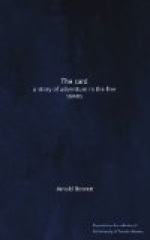In a second—so it appeared—he had reached the Countess. Just behind her was his employer, Mr Duncalf, whom Denry had not previously noticed there. Denry regretted this, for he had never mentioned to Mr Duncalf that he was coming to the ball, and he feared Mr Duncalf.
“Could I have this dance with you?” he demanded bluntly, but smiling and showing his teeth.
No ceremonial title! No mention of “pleasure” or “honour.” Not a trace of the formula in which Ruth Earp had instructed him! He forgot all such trivialities.
“I’ve won that fiver, Mr Harold Etches,” he said to himself.
The mouths of aldermen inadvertently opened. Mr Duncalf blenched.
“It’s nearly over, isn’t it?” said the Countess, still efficiently smiling. She did not recognise Denry. In that suit he might have been a Foreign Office attache.
“Oh! that doesn’t matter, I’m sure,” said Denry.
She yielded, and he took the paradisaical creature in his arms. It was her business that evening to be universally and inclusively polite. She could not have begun with a refusal. A refusal might have dried up all other invitations whatsoever. Besides, she saw that the aldermen wanted a lead. Besides, she was young, though a countess, and adored dancing.
Thus they waltzed together, while the flower of Bursley’s chivalry gazed in enchantment. The Countess’s fan, depending from her arm, dangled against Denry’s suit in a rather confusing fashion, which withdrew his attention from his feet. He laid hold of it gingerly between two unemployed fingers. After that he managed fairly well. Once they came perilously near the Earl and his partner; nothing else. And then the dance ended, exactly when Denry had begun to savour the astounding spectacle of himself enclasping the Countess.
The Countess had soon perceived that he was the merest boy.
“You waltz quite nicely!” she said, like an aunt, but with more than an aunt’s smile.
“Do I?” he beamed. Then something compelled him to say: “Do you know, it’s the first time I’ve ever waltzed in my life, except in a lesson, you know?”
“Really!” she murmured. “You pick things up easily, I suppose?”
“Yes,” he said. “Do you?”
Either the question or the tone sent the Countess off into carillons of amusement. Everybody could see that Denry had made the Countess laugh tremendously. It was on this note that the waltz finished. She was still laughing when he bowed to her (as taught by Ruth Earp). He could not comprehend why she had so laughed, save on the supposition that he was more humorous than he had suspected. Anyhow, he laughed too, and they parted laughing. He remembered that he had made a marked effect (though not one of laughter) on the tailor by quickly returning the question, “Are you?” And his unpremeditated stroke with the Countess was similar. When he had got ten yards on his way towards Harold Etches and a fiver he felt something in his hand. The Countess’s fan was sticking between his fingers. It had unhooked itself from her chain. He furtively pocketed it.




